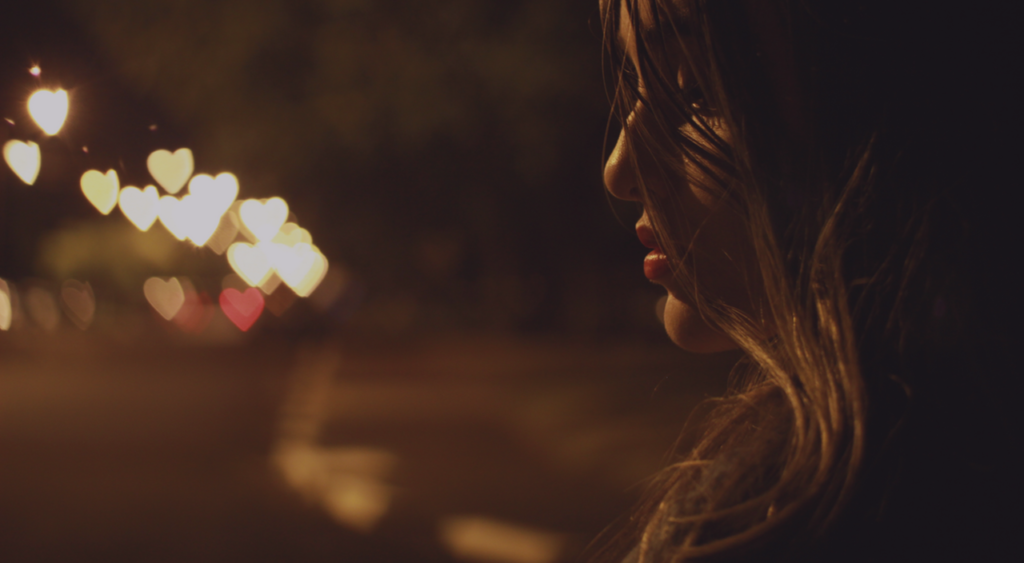We’re coming up on Valentine’s Day, the day we celebrate romantic love. But what, exactly, is romantic love? If someone asked you, “What does love mean to you?” how would you answer? Would you say it’s wonderful or would you say love hurts? Or is it some combination? 
Most of us have our own definition of love based on our experiences and desires, and pretty much all of share a vague idea of it, but much of that is influenced by society and culture. Which is why love is not easily defined.
In December, at University of British Columbia philosophy professor Carrie Jenkins‘ Metaphysics of Love conference, I met Angela Fama, an interdisciplinary Vancouver-based photographer who spent several months driving across Canada and the U.S. in 2015 asking people, “What does love mean to you?” while taking photos and audio recordings of them as they answered. The result is a film featuring about 70 of the more than 300 people she interviewed.
It’s powerful with a somewhat startling result — for me and some of the others watching it in the audience that night. While many described love as joyful, ecstatic and mysterious, about as many described it as painful and disappointing. And, interestingly, many more women experienced love as painful than wonderful.
Why?
Love, an ‘agonizingly difficult experience’?
I have begun reading sociologist Eva Illouz’s 2012 book Why Love Hurts and while I haven’t gotten too far into it, and thus will likely have a lot more to say about, Illouz says the modern world, with its deregulated of marriage markets and freedom to choose one’s own partner has, made the search for love an “agonizingly difficult experience” that leads to collective misery and disappointment, which is then internalized by people — especially women — as a personal failing. And with the push from “experts” and algorithms to turn love into a science and a rational process, love has become “the object of endless investigation, self-knowledge and self-scrutiny.”
Does that sound familiar? Uh-huh ….
This is not how we went about finding a partner in years past, when there was an understood system of signs that codified and ritualized the beginnings of love, and when one’s social class or village limited your romantic choices. No one wants to necessarily go back to the days of men calling on women (who could choose who could court her or not) under the watchful eye of family and friends, but it made falling love easier and much more intentional. The man had to commit first before a woman would even acknowledge, let alone express, her feelings for him. With no clear system in place for today’s singles, it’s a free-for-all.
As Illouz writes:
Pickiness, which seems to plague the entire field of romantic choice, is not a psychological trait, but rather an effect of the ecology and architecture of choice: that is, it is fundamentally motivated by the desire to maximize choice in conditions where the range of choice has become almost unmanageable.
That leads to a lot of unhappiness.
And the media, with all its terms for dating mishaps, from ghosting to breadcrumbing to micro-cheating — which gets beautifully blasted by the Daily Beast’s Mandy Stadtmiller as fabrications and out-and-out lies — just make us feel worse. Most of the media’s romantic advice is geared toward women, forcing us to engage in constant self-scrutiny in search of “real love,” but all that introspection does is create ambivalence and an unsettling sense that we can never truly know or trust what our feelings are.
Hot or not
Just as important, where moral character made one an attractive mate decades ago, nowadays it is one’s sexiness or “hotness” that determines if one is beautiful and desirable or not. And girls understand that at a very young age. Relying on moral character to figure out a good mate made people less vulnerable “to others’ gaze and to their validation, precisely because the actors sentiments did not radiate from the interiority of their self.” Compare that with how we go about finding a mate nowadays, swiping left on those who aren’t hot enough or who have too many spelling errors in their profile, and each rejection makes us increasingly vulnerable — we are being rejected for who we actually are, not our virtues.
And because anyone can be sexy — the wealthy and the poor, the educated and the uneducated — there are many more people competing in the “marriage market.”
Which gets us to where we are now, often experiencing love as suffering and a form of powerlessness in which, Illouz warns, “the self — its definition and sense of worth — is directly at stake.”
Has that been your experience of love?
Want to individualize your marriage? (Of course you do!) Then read The New I Do: Reshaping Marriage for Skeptics, Realists and Rebels (Seal Press). You can support your local indie bookstore or order it on Amazon.
















